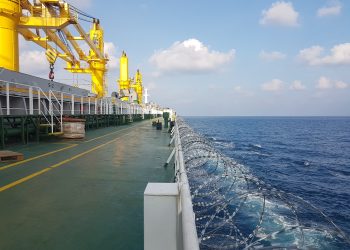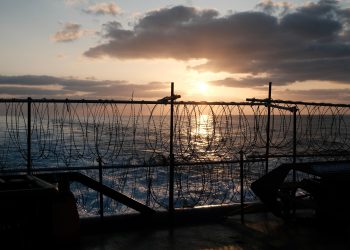Strengthening maritime cooperation between countries to combat piracy
 United States (US) Sunday said it has committed about $35 million into the training of naval personnel in Nigeria and other countries within the Gulf of Guinea on how to combat piracy, oil bunkering and other maritime crimes that have plagued the region in recent times.
United States (US) Sunday said it has committed about $35 million into the training of naval personnel in Nigeria and other countries within the Gulf of Guinea on how to combat piracy, oil bunkering and other maritime crimes that have plagued the region in recent times.
This was revealed in Calabar, Cross River State by Consular-General of the US Consulate in Lagos, Mr. Joseph Stafford, at the closing ceremony of the Obangame Express 2012, an annual naval exercise of Africa, US and Europe hosted by Nigeria. The event was also geared towards building transnational synergy on how to combat maritime crimes which cost the country $2 billion annually.
Twelve countries including the United States, Spain and some African maritime nations participated in the one week exercise with the Minister of States for Defence, Mrs. Olusola Obada, conducting the closing ceremony.
Stafford said the exercise was aimed at strengthening cooperation between countries in the Gulf of Guinea, the US, Spain, Brazil and other participating countries.
“More than $2billion is lost annually due to maritime crime. We are already getting better and growing each year to combat illicit activities that are taking place in the maritime domain. They have the primary responsibilities of patrolling their territorial waters, but beyond that, it is necessary for the West African countries to work with the US to combat piracy and the other crimes that take place in the Gulf of Guinea.
“So far, $35 million has been provided for the training of naval personnel in Nigeria and other countries in the Gulf of Guinea on the fight against maritime crime. I want to state that we would continue in this support,” he said.
Nigeria’s Chief of Naval Staff, Vice-Admiral Ola Ibrahim, in his speech, admitted that the maritime environment was increasingly threatened by security challenges such as piracy, poaching, smuggling, crude oil theft, among others, noting that the exercise was aimed at assisting countries in West and Central Africa to build capacity to combat these challenges.
Ibrahim explained that the conduct of the Obangame Express 2012 has revealed that in spite of the challenges, there has been a significant progress ever since the exercise came into being a few years ago.
Obada in her remarks, said Nigeria would continue to support any project that would help combat the security challenges that were prevalent in the contemporary maritime environment.
“Because no single nation can effectively tackle the maritime challenges alone as a result of its trans-border nature, the need for cooperation by maritime nations has become inevitable,” she said.
She commended all the participating countries and observed that the exercise was of great benefit to Nigeria and that the country will continue to participate in it
Source: This Day Live




























































